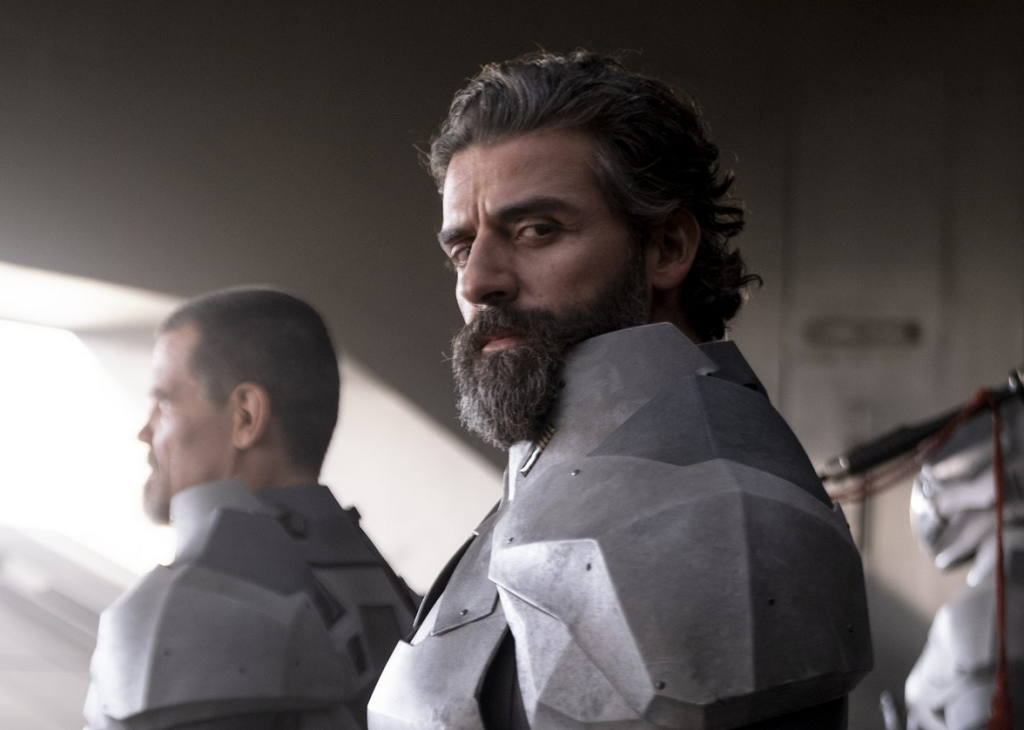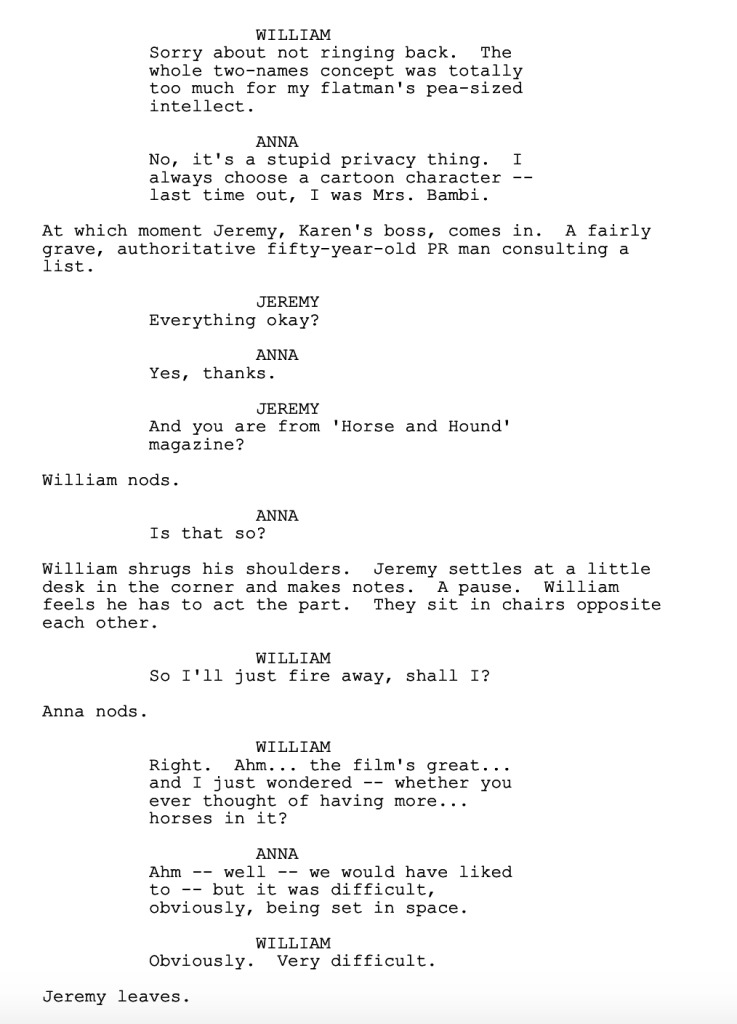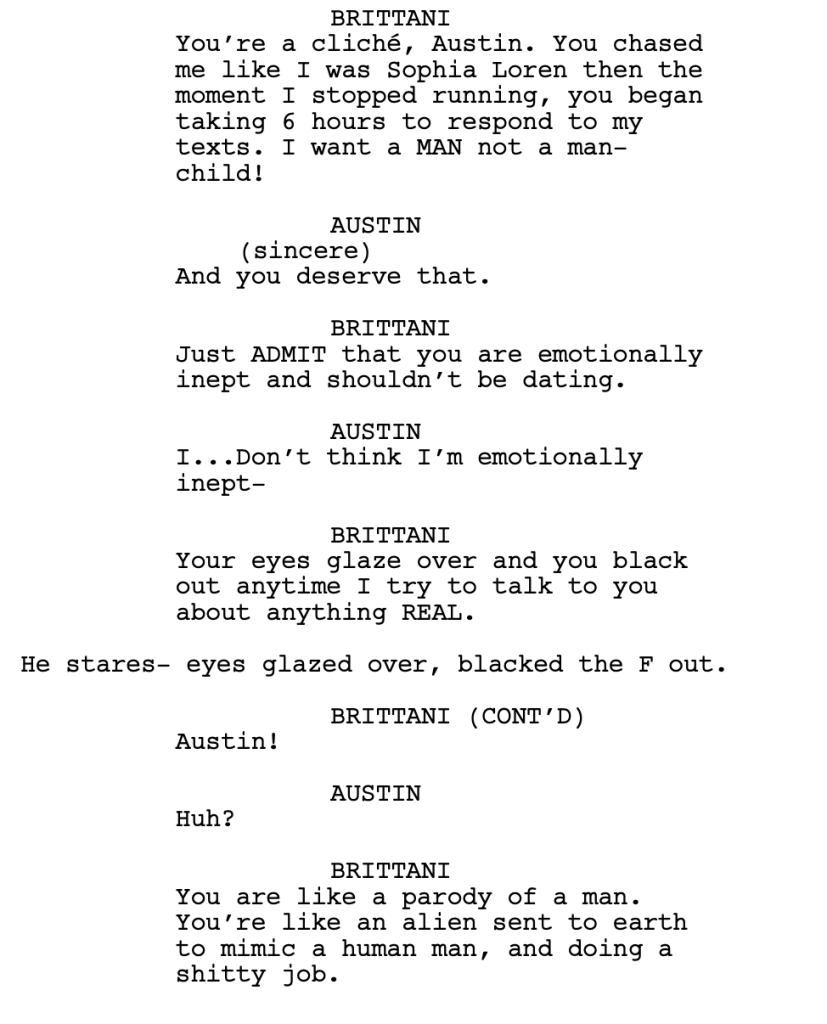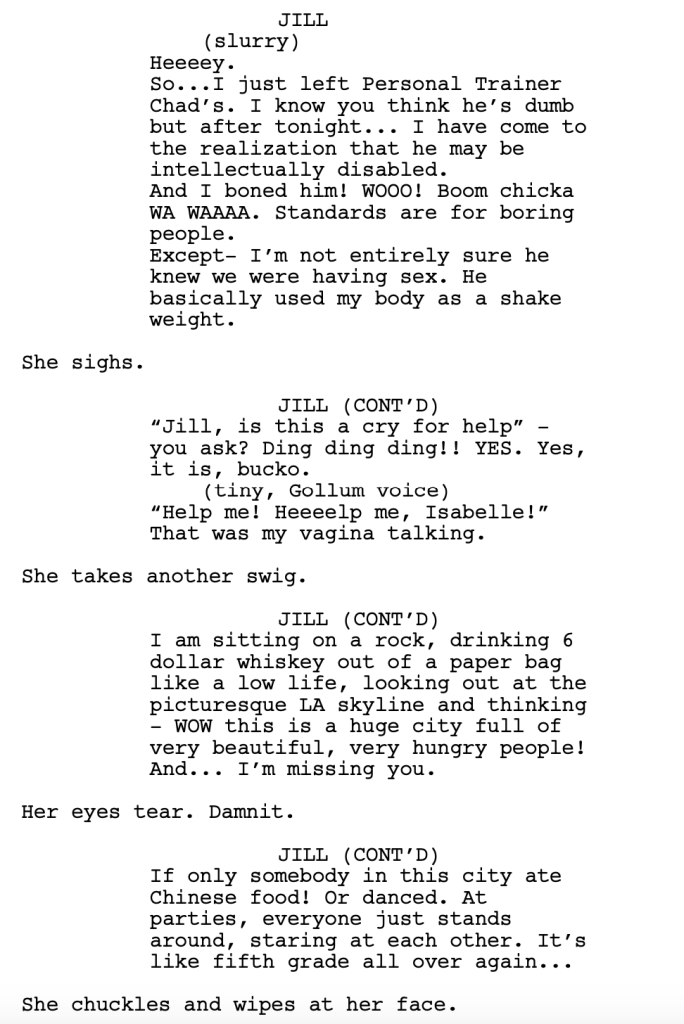I’m not in the mood to bash movies these days. As I scroll through all my streaming services desperately looking for ANY movie to watch, I’ve realized more than ever the power of Hollywood entertainment. All it takes is one minute of I’m Thinking of Ending Things to appreciate big-budget high production value cinema.
Which is why I’m so bummed after the Dune trailer. Something about it left me feeling empty. “That’s it?” I thought. Even the money shot, a giant worm, feels tiny in comparison to the giant creatures we’ve become accustomed to in movies. Oh, um, cool. It’s in sand which makes it different, I guess?
But it was something else I couldn’t put my finger on which was bothering me. It hit me after I watched the below side-by-side 1984 Dune movie comparison trailer. The two movies looked nearly identical. And everyone knows how bad that original Dune was. It was lengendarily awful.
Could it be that the real problem here is the source material? That it doesn’t matter how much you throw at Dune or who directs it. That it’s always going to be bad. Cause if you’re looking at this trailer objectively, it’s pretty darn uninspiring. It’s a bunch of sand. A bunch of good actors. A bunch of cool costumes. And… what? At least David Lynch took some chances and did some weird things with his take. This looks like a pretty garden variety adaptation.
I’m sincerely worried for Dune, a movie that was really high on my expectations list. Now I’m just hoping it’s a little better than Blade Runner 2049.
Yesterday was all about the strong dialogue.
Conversations were popping off the page throughout Voicemails for Isabelle. They were fun. They were vibrant. They were clever. Easily top 5 dialogue I’ve encountered all year.
What’s frustrating, though, is that a lot of what you saw yesterday is God-given talent. Some writers understand how people speak better than others.
I know this because I’ve read hundreds of scripts that have tried to do what McKendrick did yesterday and not even come close.
You know in movies where the characters have been friends all their lives but the actors just met a day ago because it was their first day on set? They’re supposed to act effortless and natural around each other but how can they when they barely know each other? That’s called forced camaraderie. And it’s the same feeling a reader gets when a subpar dialogue writer is trying hard to write witty dialogue between characters. It doesn’t feel honest.
So what should you do under those circumstances? Quit screenwriting?
No, of course not. That would be silly. Like I said yesterday, only 20% of the scripts I read have awful enough dialogue or awesome enough dialogue that I notice (and most of that 20% is the awful kind). The other 80% is decent enough that it doesn’t bother me either way.
As long as you still know how to tell a great story or still know how to write interesting characters or still know how to come up with a strong concept and execute it solidly, you don’t need to knock your dialogue out of the park. Especially if it’s in a genre that doesn’t need stand-out dialogue, such as horror.
But luckily, there is a trick you can use to create better dialogue scenes, even if dialogue isn’t your forte. I call it the Third Variable.
Naturally, gifted dialogue writers only need two characters and a keyboard – or “two variables” – to write great dialogue.
While us not-as-gifted writers may not be able to play at that level, we can add a THIRD VARIABLE to the scene which intrudes upon the predictable two person interaction to, in turn, elevate it.
The most obvious example of this is to add a third character to a scene. Say your husband and wife characters are arguing with each other one morning. We’ve seen a million arguments in movies so it’s difficult to do anything special with that dialogue. But let’s say you add a maid to the scene. She’s cleaning in the same area that they’re fighting in. This would then result in them speaking around some things. Or being more selective in what they say.
You may not realize it yet, but this is the secret to good dialogue. Characters who can say whatever they want is rarely interesting. I guess for certain sitcom characters, like Sheldon from Big Bang Theory, it works. But in movies, you want to restrict your characters in some way so that they have to dance around the things that they would normally say. This is where you find more creative choices in dialogue because you’re not allowed to use default responses.
By the way, I’m calling it the third “variable” rule as opposed to the third “person” rule for a reason. Because an extra character isn’t the only way to exploit the Third Variable. You could also exploit it, for example, with a TIME RESTRICTION.
Let’s say our same husband character is taking his daughter to school. The two get in an important discussion. The dad wants to explain to his daughter that he and her mother are fine. The problem is, they’re a minute away from school. And the daughter is getting more upset by dad’s explanation, not less.
Time now plays a critical role in the dialogue because the dad has to rush the explanation when this is clearly a discussion that needs more time to be explained productively.
You notice the common factor here? Once again, the third variable is keeping our hero from being able to say the things he wants to say in the way he wants to say them. That’s where you want your characters to be in a dialogue scene. You want them unable to say the things they want to say, which forces the writer to come up with more interesting choices.
Yet another third variable could be the weather. Romeo and Juliet having a conversation on a sunny afternoon is going to look different than if it’s 10 below zero outside. They’re going to be a lot less interested in exchanging love soliloquies than they are jamming their fingers on their frozen iPhones to get their Uber to show up faster.
Same idea, guys. The weather is keeping our characters from saying what they would normally say.
I’ll give you a personal account of how I accidentally stumbled upon a third variable moment without realizing it. I once wrote a script where the two main characters, an older man and a woman, were roommates. One night, he had to come home and explain to her that he couldn’t afford his half of the apartment anymore and was going to have to move out.
I wrote the scene 5-10 times and it was always boring. Boring on-the-nose dialogue. It was like the reader already knew the conversation so what was the point in me writing it? I might as well have written “You know what they’re going to say here so fill it in yourself.”
In the next draft, I did more work on the female roommate and realized she was a big book reader and that she had a book club that met at their apartment every week. So in the next pass of the script, I thought to myself, “why not put her book club meeting in the scene?”
This time, the male roommate comes back to a big book club meeting. The book club then BECAME THE THIRD VARIABLE. All of a sudden, the scene became a lot more interesting. You had weird, funny, and one horny, book club members chiming in, and just like that, the dialogue came alive.
Just being aware of the Third Variable Tool is going make you a better dialogue writer. But the power of the Third Variable works best when the variable itself is creative and when the way you implement is creative.
To this day, one of the best THIRD VARIABLES I’ve ever come across was the first date scene in Notting Hill. 99% of writers would’ve written Hugh Grant and Julia Roberts’ first date at a fancy restaurant with a lot of people gawking. It’s such an obvious setup for their situation (which should always act as a red flag that you shouldn’t write it).
Instead, Julia Roberts has Hugh Grant unknowingly come to the PRESS JUNKET for her latest movie. The press junket then becomes the THIRD VARIABLE. Every time he tries to talk to her, someone gets in the way. A curious fellow journalist. An actor who needs to be interviewed. The junket coordinator who keeps peeking in on their only private conversation (“Three minutes left!”). That’s what I mean when I say a creative third variable.
An uncreative third variable in that circumstance would’ve been – oh I don’t know – Hugh Grant’s parents or something.
What I mean about how creatively you implement your third variable is how cleverly it interrupts the scene’s key interaction. Let’s go back to my first example from this article. A married couple with a maid is in the room. In a pinch, this can get the job done. But there’s no connection between the variable and the primary characters.
What would be better is if our married couple was having troubles due to the husband’s recent infidelity. From there, you would make the maid extremely attractive. Now, we have this wife who’s very sensitive to her husband’s interest in other women and, to make matters worse, while they’re hashing this problem out, there’s a very attractive female in the room. It’s going to give you that little extra kick to the conversation.
How often should you use the Third Variable? Technically, you can use it for every single dialogue scene as long as you do a good job varying the third variable. If you only ever add a third person, it’s going to start to feel manufactured. You have to throw in time. Or weather. Or a party. Or have one of your characters deliberately stop in the middle of an intersection clogging up traffic so that all of the cars are honking at you to move – write us a conversation in that environment (Training Day).
But you should definitely mix in straight dialogue scenes. I was just watching The Marvelous Mrs. Maisel because I remembered the dialogue being so memorable in that show. And while they do use a lot of Third Variable scenes, there are plenty of one-on-one conversations as well.
You just have to make sure you’re doing the basics right in those scenes so that you’re giving yourself the best chance to write good dialogue. One character wants something in the scene. Usually, the other character doesn’t want to give it to them. This creates conflict within the interaction, which in turn leads to dialogue with more pop to it.
And just try not to write the dialogue exchange that 99 out of 100 writers would write. Every time you walk into a scene, you’re writing a situation that has been written thousands if not millions of times already. Figure out what the most common version of that conversation looks like and make sure you don’t write that.
I can give you one last tip to avoid that. In the middle of your dialogue scene, have one of the characters say something that nobody expected them to say (even you, the writer!). That will send your dialogue down an unexpected direction, and that’s when dialogue comes alive. Dialogue is rarely interesting when everyone says what we expected them to say.
This happened in the episode of Mrs. Maisel that I researched. Mrs. Maisel was in court about her lewd stand up routine that sent her to jail. All she has to do, her lawyer tells her ahead of time, is nod and say thank you. So the first half of the scene goes according to plan. But when the judge brings up how stupid it was for Mrs. Maisel to do what she did, she can’t hold back and explains why there was nothing wrong about what she did at all. The dialogue in the rest of the scene was great. All because a character went in an unexpected direction.
I love the Third Variable tip. Whenever you’re struggling to make a dialogue scene work, try this out. I guarantee it will improve the dialogue. Go ahead and share your favorite third variable scenes in the comments. I want to learn about as many of these examples as possible.
Check out my interview with writer Leah McKendrick here!
Genre: Rom-Com
Premise: (from Black List) A low-level TV writer struggles to cope with the death of her little sister by continuing to leave her voicemails chronicling the shitshow that is dating in LA. When the phone number is unknowingly transferred, a cocky New York real estate agent begins receiving the hilarious and confessional voicemails, and feels pulled to California to find this stranger he feels intimately close to.
About: This spec script squeezed onto last year’s Black List with six votes. It’s become a hot project over at Sony, which preemptively purchased the script. They’ve added Hailee Steinfeld to play the lead and Sharon Maquire (Bridget Jones) to direct. Leah McKendrick is an actress and writer. She appeared in Bad Moms and she’s writing the upcoming Grease prequel.
Writer: Leah Mckendrick
Details: 117 pages
When you look through all the remaining 2019 scripts (that I haven’t read), Voicemails for Isabelle is the best concept left. And it has some high-level talent attached to it. The director of the Bridget Jones movie is helming. Hailee Steinfeld is playing the lead. That’s better than what I usually see with Black List scripts, which often don’t have anyone attached. Will this be good? If so, I promise to leave a voicemail to the writer.
Jill and her sister, Isabelle’s, relationship has always been wonderful except for one thing – Isabelle has cystic fibrosis. But she’s a fighter and she fights her way through elementary school, through high school, through Jill’s college, and even through the first part of Jill’s adult life.
But when Jill turns 29, her sister finally dies, and all of a sudden everything in the world is pointless. After the funeral, Jill heads back to LA, where she’s chasing her dream of becoming a TV writer and trying to find a boyfriend 4 life. That’s where the comedy begins. Because every man Jill runs into is a disaster.
So Jill uses her sister’s old voicemail account to leave her LA writer dream dating disaster life play-by-play. It’s the perfect coping mechanism. It allows her to still connect with her sister as well as get out all of her frustration of trying to make it in this city.
What Jill doesn’t know is that Isabelle’s number gets changed and that a real estate agent back in New York named Austin is now receiving the voicemails. At first he finds them funny. But then he starts getting invested in all the stories, particularly the latest one, where Jill thinks she’s found the love of her life in British dating coach, Chad.
But when Chad ghosts Jill, she decides to confront him at one of his book readings. And since Jill told “Isabelle” about this, Austin knows where she’s going to be. So he flies to LA to meet Jill under false pretenses, telling her “that was amazing!” after she tells off Chad, and the two start dating.
But this puts Austin in an awkward place. He now has insight into his relationship situation with Jill because she’s now talking about HIM to her sister. Unfortunately, this doesn’t help matters because Jill is super duper in love with Austin and that scares him off. Will he get over this fear? Will he tell Jill the truth about the voicemails? We’ll have to find out when the movie’s made!
Wow.
This was… unexpected.
Like unexpectedly awesome!
And not just normal awesome. Really awesome.
Let’s figure out why it worked because ideas like this have huge cringe-potential so if you don’t have a strong voice and a solid plan, they can fly south quickly. I know because I’ve read all those fly-south-for-the-winter screenplays.
For starters, it gets off on the right foot. If you’re going to deal with a horrible disease, it’s hard to do so when you lean into the sadness and depression of it. Yes, that tends to be more authentic. But it doesn’t go over well in movies. In movies, cancer (or in this case, cystic fibrosis) plays better when you go against the expectation. “Voicemails” gives us that. All mentions of the sister’s disease are placed within humorous or “humorous-adjacent” situations.
That immediately got rid of my worry that this was going to be a Depression Fest.
You know something’s working when, even though you know the death is coming, you still tear up. This had me before we even got to the second act.
The other big gold star goes to the dialogue. This writer is really good with dialogue. I get dinged a lot because I don’t talk about dialogue much in my reviews. But that’s because I only notice dialogue when it’s really good or really bad. And with the large majority of scripts, it’s somewhere in between.
But McKendrick has that extra something special in her dialogue. She knows exactly how to use humor to defuse moments that get too serious or too sad. Her timing in that area is impeccable. Combine that with a clear knowledge of the subject matter and a lot of specific detail in the dialogue – not to mention she’s been blessed with a movie-perfect sensibility for humor – and you get this script.
Here’s an early exchange.
And here’s one of her voicemails.
If you’re a writer who wants to know exactly what Hollywood is looking for in their theatrical release comedy or romantic comedy departments, read this script. This shows you where the bar is. The dialogue here is so solid throughout. Hats off to McKendrick.
There were also a lot of little impressive things about the script. For example, it has this great underlining angle of dramatic irony in that we know Austin is receiving the voicemails but our protagonist does not. This makes his courting of her that much more interesting because we know he’s got to tell her the truth at some point.
What’s really clever that McKendrick does, though, is that Austin chickens out on telling Jill, which then turns dramatic irony into ULTRA DRAMATIC IRONY. Cause Jill is now unknowingly giving Austin a play-by-play on what she’s thinking. I don’t think I’ve ever seen someone turbo-boost an already established dramatically ironic plotline like that before.
The script isn’t perfect.
There’s a teensy too much generalizing with the male characters here. Not all guys are white privilege jerkaloos who think women are playthings. You want to treat every character on an individual basis, man or woman. Generalizing against either gender is only going to hurt the authenticity of the story.
The second issue was more technical. In every rom-com you have the boy loses girl moment late in the second act (or, in this script, the ‘girl loses boy’ moment). These are deceptively difficult scenes to write. Nine times out of ten, with the scripts I read, these moments are poorly written. The writer orchestrates a totally unbelievable reason for why the girl loses the boy, and it ends up ruining the whole third act.
“Voicemails” had one of the best options for an authentic “girl loses boy” scenario. All you had to do was have Jill find out Austin was listening to the voicemails this whole time. INSTANTLY everyone in the audience would understand why Jill left him.
Instead, though, Jill leaves a voicemail to “Isabelle” (aka, Austin) about how into Austin she is. As a result, Austin gets scared by her intensity and doesn’t feel like he’s “ready” for such a strong relationship so he breaks up with her. We then save the “I was listening to the voicemails” moment for later.
Hmm… I’m having trouble with this.
The guy who’s spent the last five months breathlessly listening to every voicemail of this woman while falling in love with her and then traveling to LA to sneakily meet up with her is all of a sudden scared that things are “moving too fast.”
Plot points aren’t as believable when they’re inconsistent with the characters you’ve developed. And the thing is, you already had the great ‘breakup’ plot point written for you! So that was the one frustrating choice to me.
The good news, however, is everything else here is top-notch.
This is Hollywood level dialogue. The main character is super-likable. I love the fresh update on an old proven Hollywood formula (You’ve Got Mail). But most of all, I really like this writer. She’s funny and fits perfectly into this type of film. Looks like I have a voicemail to leave. Anyone know Leah McKendrick’s number?
[ ] What the hell did I just read?
[ ] wasn’t for me
[xx] worth the read
[ ] impressive
[ ] genius
What I learned: Call out the elephant in the room. I have a feeling that McKendrick started this script a long time ago. Voicemails are somewhat outdated. When this happens – and it *will* happen with any idea that has a technology component – there’s a little trick you can use to get away with it. Basically, you need to have a character call out the elephant in the room. So, here, in a scene where Jill goes to Apple to try and recover some voicemails she lost during a software update, as she’s pleading her case to the Apple employee, the woman behind her comically yells out, “Who the f- uses voicemails anymore!” She literally calls out the elephant in the room. It’s not a perfect solution. The better solution is to stay away from ideas that will date quickly. But if you’re already there, this helps you a little bit.
Genre: Horror
Premise: A mother and her twin teenage sons live in a remote cabin where they’ve developed a system to protect themselves from the evil that has destroyed the rest of the world.
About: Shawn Levy can’t get enough! Even after becoming Netflix’s number 2 man behind Reed Hastings, the Stranger Things producer wants an even bigger piece of the entertainment pie. This time he’s teaming up with Lionsgate to produce today’s spec script, written by newbies Kevin Coughlin and Ryan Grassby. Yes, Coughlin and Grassby have a couple of produced credits, but come on, one look at those credits and you know they had nothing to do with this sale. I’m pointing this out as a reminder that it’s possible for all of you to break in with a spec script. Never give up. Never surrender!
Writer: Kevin Coughlin & Ryan Grassby.
Details: 103 pages
Are crazy moms the new trend??
I dunno.
First Raised by Wolves and now this! I’m sure it’s only a matter of time before we get a coalition of mothers marching down Sunset Boulevard infuriated about their stereotyped representation in film. Until then, let’s all enjoy the craziness. Because it’s oh so boring when everything is running smoothly, don’t you think?
Momma lives in a remote cabin in the woods with her 14 year old twin boys, Nolan and Samuel. We can tell right away that something’s up. They have to pluck crickets, pick plums, and and set squirrel traps just to eat. Nothing like a plum squirrel sandwich.
Oh, and they all wear ropes around their waists that are tied to the house. Nobody can ever go anywhere without a rope. They’re like Motherland’s version of corona masks. Except instead of being shamed on Twitter, you’re killed.
By who?
That would be the “evil.” The “evil” is what destroyed the rest of the world, leaving this family as the only three human beings left. Luckily, Momma figured out how to defeat Evil. You have to always wear a rope. Lose the rope and Evil will snatch you up and pull you away.
Whereas Samuel is Team Rope, Nolan has lots of questions about the ordeal. Just how far has Mother looked? Is she SURE they’re the last people on the planet? Mother says she is absolutely sure.
However, things get real when Momma dies and they start starving. It would sure be nice, Nolan thinks, if they could go beyond the radius of these stupid ropes to look for more food. One day, he’s had it. So he goes to the edge of his rope and screams, “Help!”
Twenty minutes later, a hiker shows up. He sees the emaciated Nolan and tells him he can help. Let’s get you back to my truck. Just then, Samuel shows up with his crossbow. He tells the man, who he believes is the Evil, to leave. Confused, the man pleads his case, only to be shot.
Nolan and Samuel will have to figure out soon which worldview is the real one. Cause either more people are going to show up looking for this man, or Evil in Disguise is going to keep coming until it’s tricked and murdered them. The day of reckoning is near.
One word I’d use to describe this script?
Ambitious.
I wouldn’t have said that when I started reading it. But by the time I finished it, I realized there were a couple of complex themes being explored. Were those themes explored successfully? I’ll get there in a second. First, let’s break Motherhood down.
Here’s what I liked about the script. It built its entire structure around your expectations. Remember that awful M. Night movie, The Village? The one where a bunch of people are living in the year 1850, deep within a forest village? Then, at the end of the movie, we realize they’ve all been tricked and it’s actually present day?
Motherland could’ve done the same thing. Instead, it leans into the possibility that the children are being lied to. That makes us think, “Oh, we’ve been down this road before. It’s another Village situation!” This makes us feel smart, like we’re ahead of the story.
But then, just as we believe that the big reveal will be made and we can throw our hands up in victory: “See! We knew all along! We’re movie cinephiles!!!” Instead, Coughlin and Grassby start throwing in doubts that we’re living in the village. Maybe, just maybe, Mother was being truthful the whole time.
This is what saves the script. Because now, in these final 30 pages, you’re not sure which is true. Were the kids lied to or is there really an “evil?”
On top of that, Motherland explores the theme of perception in a very thoughtful way. All of us are the sum of our influences. Our parents, our friends, our faith, the things we read, the news we consume. All of that forms our belief system – how we see the world.
Motherland strips that down so that there’s only one influence – her. And what that does is it allows us to see how powerful influence can be. If you’re a kid who’s only ever known one parental figure and, therefore, they are the only one providing you with a worldview, it’s possible for you to have a completely incorrect worldview despite the fact that you’re positive it’s the right one.
That reality alone is a horror movie.
Because think about it. That’s exactly what’s going on right now. We’re all following our own “Mothers” who are giving us all the “correct” information, and we’re basing our entire approach to life around that. And many of us, despite not knowing it, are dead wrong in our world view. And no, I’m not going to get into the specifics about who because it literally happens on all sides.
But the point is, by distilling everything down to one influencing variable, it puts a spotlight on the theme of influence so that we understand how powerful it can be.
With that being said, there were times where the script couldn’t stand on its own two feet due to its shaky rule set. For example, the ropes. Let’s think about this for a second. We’re told that the ropes are magical lassos protecting us from the “evil.” If your rope is cut, you are susceptible to being eaten or murdered or taken away by the “evil.”
This rule alone had issues. The mother can see Evil in physical form but the kids cannot? So wait. If the evil has the choice of not showing itself, which it clearly does since the kids don’t see it, then wouldn’t it choose not to be seen by Momma as well?
That would allow it the advantage of being able to sneak up on Momma whenever it wanted. Sure, staring at momma in the form of a creepy delusional old woman makes for a creepy moment. But it’s working against its own goal, which is to kill her. Every time you show me how scary you can be, I’m going to be even more diligent about making sure I don’t fall for your tricks.
But that isn’t the real part that bothered me. The real part was the rope carried a convenient dramatic safeguard for the writer. Had there been no rope, the kids would’ve easily been able to confirm whether there was a Walmart six blocks away. Which made me think back to the original purpose of the rope. Which is to protect each of them from Evil killing them.
So Evil can’t kill people if they have a *rope* around them??? What????
The more you thought about it, the less it made sense. And because that rule was a story pillar (a centerpiece for how the story operated), it weakened the over impact. Again, this is why A Quiet Place was such a perfect concept execution. No crazy conflicting rules. If you made a noise, you were dead.
I’m torn about Motherland.
It’s imaginatively sloppy, which is about as backward a compliment as I can give. But that rope stuff – I concede that that type of visual works well in horror. Combine that with the “evil” being able to take on many creepy forms and you’ve got yourself a really effective trailer. There may be something here. It’s enough for me to recommend the read. But just barely.
[ ] What the hell did I just read?
[ ] wasn’t for me
[x] worth the read
[ ] impressive
[ ] genius
What I learned: Have a character answer their own question – This is an old dialogue trick that I’ve always liked. At one point, Nolan asks Momma if what she’s saying about the world is true. Normally, these kinds of question and answer exchanges have NOTHING to do with the characters. They’re solely put there as a way for the writer to get exposition to the reader. The average writer would then have Momma explain what happened to the world to convince her son that, yes, it’s all real. Instead, Coughlin and Grassby have Momma give Nolan a stern look. Nolan then begins to recite the story *that mother has already told him dozens of times before about what happened to the world*. It’s all exposition but we don’t notice it as much when the character asking the question is also answering. For whatever reason, there’s something about when Character A asks and Character B answers that screams, “HERE’S EXPOSITION FOR YOU.” Cover that up with a character answering their own question.
Okay, everybody. Monday is Labor Day so I’m not going to be back until, gasp, TUESDAY! I mean, the madness, right? How are we going to survive without our Scriptshadow updates?
Well, building off yesterday’s article about READING SCRIPTS, I’m going to make this the official script trading thread. Here you can talk about recent script sales, older hard-to-find scripts, hot adaptations, your favorite screenwriters and those elusive deep cuts you’re desperate to read.
I know there are readers of the site with scripts to share. Well, let this be thy opportunity to do so. We all need to read more but, first, we have to have scripts to read!
Don’t just take. Give. That way we can all read screenplays to our heart’s content! :)









